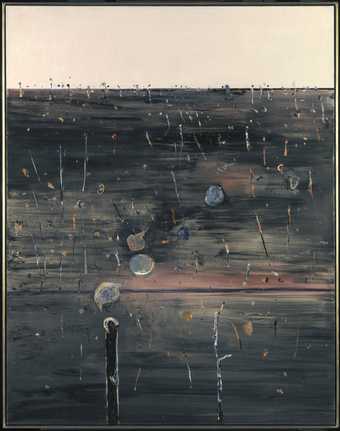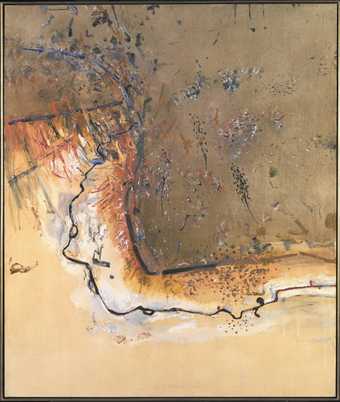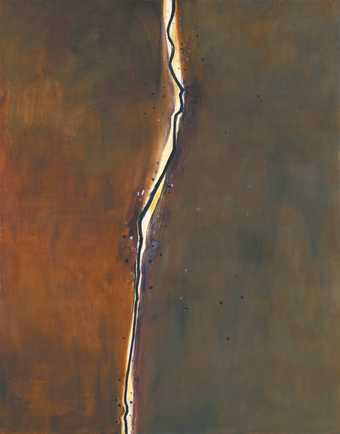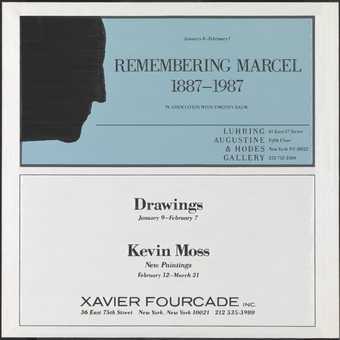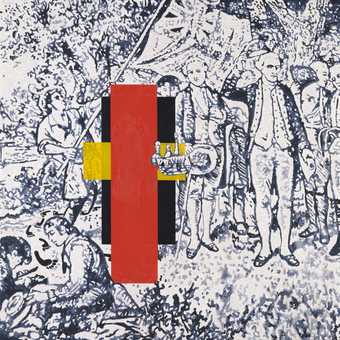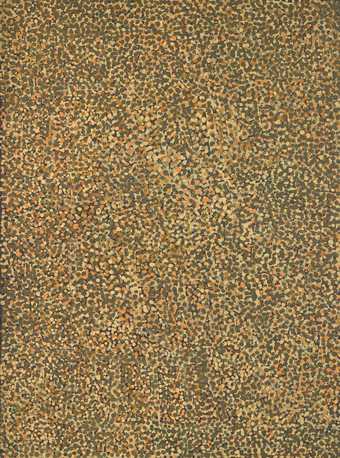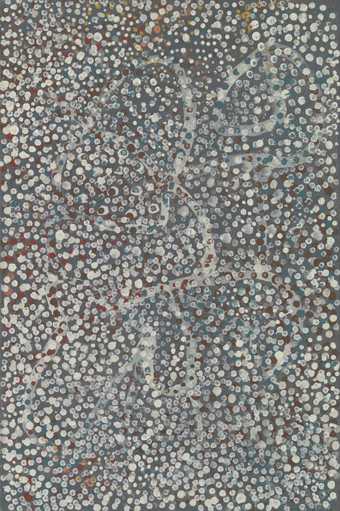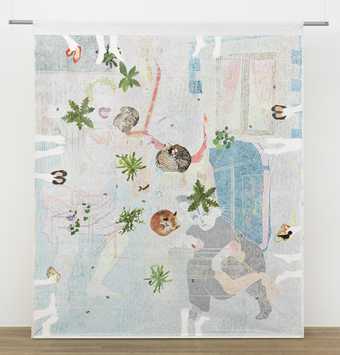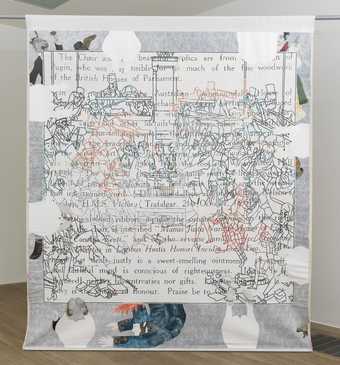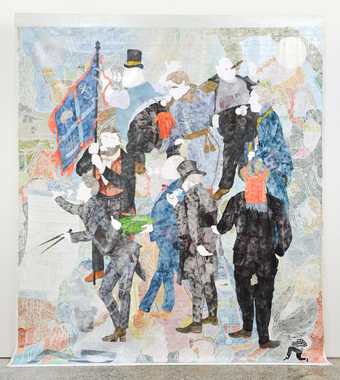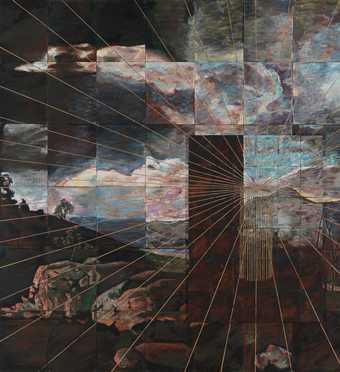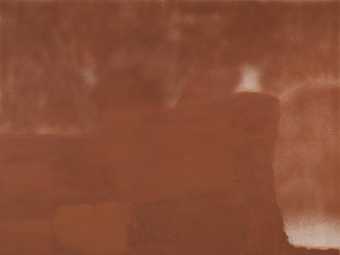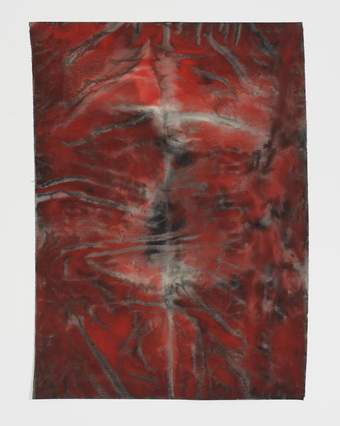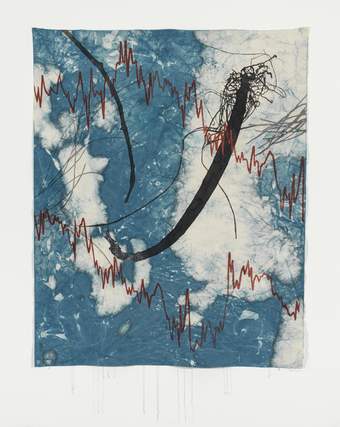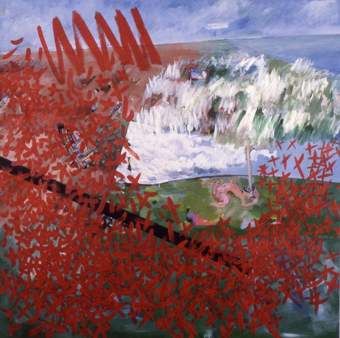
Not on display
- Artist
- Emily Kame Kngwarreye 1910–1996
- Medium
- Acrylic paint on canvas
- Dimensions
- Support: 897 × 1204 mm
frame: 1080 × 1390 × 70 mm - Collection
- Tate
- Acquisition
- Purchased with funds provided by Lady Sarah Atcherley in honour of Simon Mordant 2019
- Reference
- T15133
Summary
Untitled (Alhalkere) 1989 is an acrylic painting on linen which features small dots in ochre, red-brown and white that cover the entire surface. Kngwarreye began to paint with acrylic in late 1988, when she was already in her seventies, and this work is one of her earliest paintings on linen; between 1988 and her death in 1996 she created over 3,000 paintings. Prior to this she made batik-based fabric works, starting in 1977 when a workshop was set up as part of women’s adult education courses in her native community in the Alhalkere land of the Utopia region, 270 kilometres north-east of Alice Springs, in the Northern Territory of Australia.
Kngwarreye’s paintings are formally abstract, consisting of dots, lines or coloured fields. Her work was inspired by her cultural life as an Anmatyerre elder, and her lifelong custodianship of the women’s Dreaming sites in her clan country of Alhalkere. Seemingly abstract dots and lines in her work often resemble the vegetation, animals and landscape of the country as well as her ancestral stories. As with other contemporary Aboriginal art in Australia, Kngwarreye’s work is closely connected with contemporary issues surrounding identity and land right within a post-colonial condition, while also sharing formal affinities with abstract modern art movements.
In paintings such as Untitled (Alhalkere), Kngwarreye painted on unstretched linen laid flat on the ground, in a similar manner that she would also make traditional sand paintings for women’s ceremonies in her community. The location of Alhalkere, also known as ‘Alalgura’, is central in Kngwarreye’s imagery. The ‘dots within dots’ style is characteristic of her work, representing plant seeds that are native to her land, while also seemingly abstract. This is also seen in two other paintings, also in Tate’s collection, Endunga 1990 (Tate T15134) and Untitled 1990 (Tate T15135). The artist also chose colours that stem from nature and her community surroundings, often chiming with the seasons. Dots are widely used in Australian aboriginal art, in particular by artists in Papanya Tula, an area in the Western Desert, but Kngwarreye’s dot paintings such as this one are distinctive in their non-figurative composition and lack of direct connection to the creation stories or ‘Dreamings’ commonly found in aboriginal art. The four edges of the painting, where they wrap round the stretcher, are painted in short brown and black stripes that are similar to the body-painting lines used in Anmatyerre women’s ceremonies, in which Kngwarreye was a key elder. They also often indicate rivers and the terrain of the community’s landscape.
A closer examination of the Alhalkere landscape reveals that Kngwarreye’s paintings are surprisingly accurate depictions of actual surroundings, originating in her deep understanding of the land as a complex link between places and people that contains traces and memories of the past, present and even future, a unique notion of time that indigenous people describe as ‘everywhen’. Her works are therefore simultaneously abstract and representational. In a rare interview in 1990 with Rodney Gooch, a long-time manager of Central Australian Aboriginal Media Association (CAAMA) that facilitated the sales of artworks from the Utopia including hers, Kngwarreye talked about her imagery: ‘Whole lot, that’s whole lot, Awelye (my Dreaming), Arlatyeye (pencil yam), Arkerrthe (mountain devil lizard), Ntange (grass seed), Tingu (Dreamtime pup), Ankerre (emu), Intekwe (favourite food of emus, a small plant), Atnwerle (green bean), and Kame (yam seed). That’s what I paint, whole lot.’ (Translated by Kathleen Petyarre, in M. Boutler 1991, p.61.) In other words, rather than being descriptive of elements of a landscape, her paintings could be understood as encapsulating a totality of the conditions of her identity and life. Throughout her prolific artistic career, Kngwarreye continued to document and interact with her land, and played a seminal role in preserving its integrity in accordance with her ancestral journeys.
Further reading
Margo Neale, Emily Kame Kngwarreye: Alhalkere: Paintings from Utopia, exhibition catalogue, Queensland Art Gallery, Brisbane 1998.
Michael Boulter, The Art of Utopia: A New Direction in Contemporary Aboriginal Art, Sydney 1991.
Sook-Kyung Lee
September 2018
Does this text contain inaccurate information or language that you feel we should improve or change? We would like to hear from you.
Display caption
Kngwarreye was an Anmatyerre Elder. Her artwork focuses on the area where she lived - Alhalkere country, in the Utopia region of the Northern Territory. The dots and lines in her work often represent the vegetation, animals and landscape of the country, and relate to the Anmatyerre Creation Stories. Untitled (Alhalkere) is one of Kngwarreye’s earliest works using acrylic paint on canvas. She began painting with acrylic in late 1988, when she was already in her seventies. She had previously worked in batik, which is a wax-resist dyeing method originating in Indonesia.
Gallery label, July 2021
Does this text contain inaccurate information or language that you feel we should improve or change? We would like to hear from you.
You might like
-
Fred Williams Burnt Landscape II (Bushfire Series)
1970 -
Fred Williams Dry Creek Bed, Werribee Gorge I
1977 -
Fred Williams Riverbed D
1981 -
Simon Linke Remembering Marcel 1987
1988 -
Gordon Bennett Possession Island (Abstraction)
1991 -
Emily Kame Kngwarreye Endunga
1990 -
Emily Kame Kngwarreye Untitled
1990 -
Helen Johnson Bad Debt
2016 -
Helen Johnson Seat of Power
2016 -
Helen Johnson A Feast of Reason and a Flow of Soul
2016 -
Imants Tillers Kangaroo Blank
1988 -
D Harding The Leap/Watershed
2017 -
Judy Watson massacre inlet
1994 -
Judy Watson memory scar, grevillea, mangrove pod (& net)
2020 -
Vivienne Binns The Aftermath and the Ikon of Fear
1984–5

